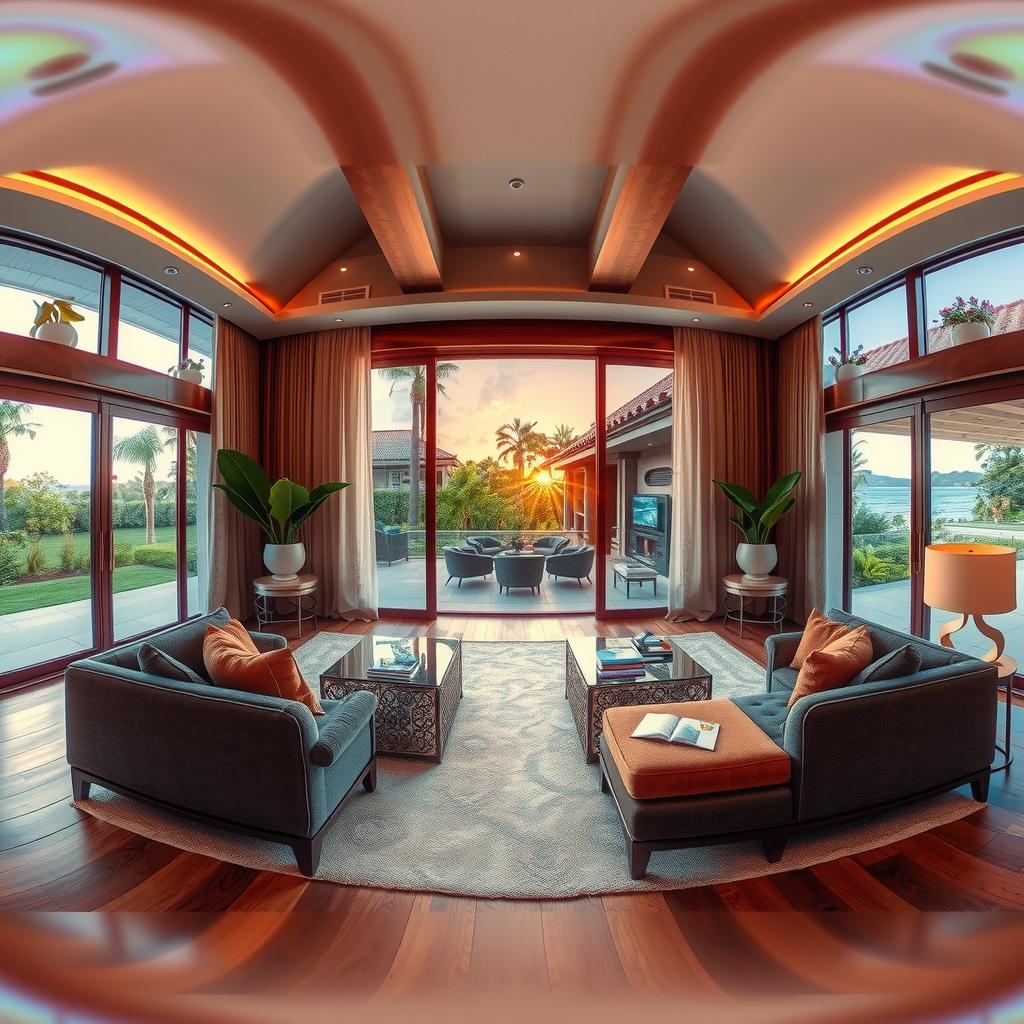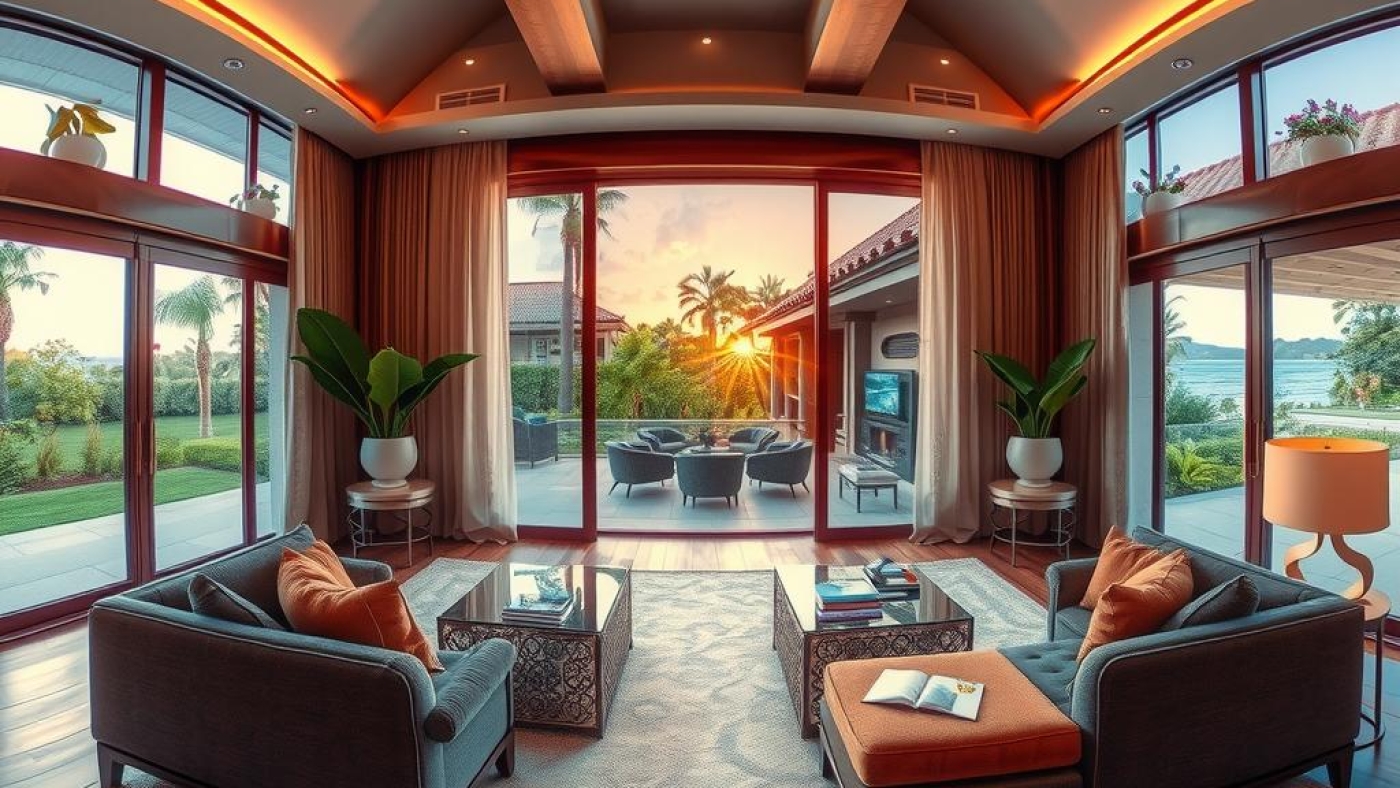In today’s fast-paced real estate market, capturing the attention of potential buyers is more challenging than ever. With countless properties vying for interest online, traditional methods of showcasing homes often fall short. Enter virtual reality real estate virtual tours—a groundbreaking innovation that not only enhances property marketing but also significantly boosts engagement and sales conversions. As prospective homeowners increasingly seek immersive experiences before making a decision, understanding the return on investment (ROI) associated with these advanced tools becomes paramount.
The core value of this article lies in exploring how virtual tours can transform the way properties are marketed and sold. By creating an engaging online viewing experience, agents can provide potential buyers with a sense of presence that static images or videos simply cannot match. This dynamic approach to property presentations not only attracts more viewers but also fosters deeper connections between listings and interested parties.
As we delve into the world of virtual reality, it will become evident how these tours serve as a powerful solution to common challenges faced by real estate professionals today. From maximizing buyer engagement to leveraging current real estate trends, understanding the multifaceted advantages offered by this technology will be crucial for anyone looking to stay ahead in the competitive landscape.
Join us as we unpack the intricacies of virtual reality real estate virtual tours and their undeniable impact on ROI—this journey promises valuable insights into enhancing property marketing strategies while reaping substantial financial rewards in an evolving market environment.

Key Takeaways:
-
Enhanced Buyer Engagement: By utilizing virtual reality real estate virtual tours, agents can offer prospective buyers an immersive experience that traditional photographs cannot provide. This innovative approach allows clients to explore properties in a dynamic way, leading to heightened interest and deeper engagement.
-
Improved Sales Conversion Rates: Listings featuring virtual tours have been shown to attract significantly more inquiries compared to those without this technology. As potential buyers become increasingly accustomed to online viewing options, incorporating these cutting-edge solutions can lead to quicker sales cycles and higher conversion rates.
-
Competitive Advantage in Property Marketing: In a competitive real estate market, adopting virtual reality real estate virtual tours places agents ahead of the curve. By effectively showcasing unique property features through immersive experiences, they can better cater to tech-savvy clients who expect advanced marketing strategies aligned with current real estate trends.

The Transformation of Property Marketing Through Technology
Virtual Reality: A Game Changer for Real Estate Sales
In the rapidly evolving landscape of real estate marketing, virtual reality (VR) technology stands out as a transformative force that is reshaping how properties are showcased to potential buyers. Traditional methods such as open houses and static images often fail to capture the full essence of a property. In contrast, virtual tours offer an immersive experience that allows prospective homeowners to explore spaces at their own pace from anywhere in the world. This innovation not only enhances buyer engagement but also significantly improves sales conversion rates by providing a realistic feel for homes before physical visits are made. According to recent studies, incorporating VR into property marketing strategies can lead to higher return on investment (ROI) due to increased interest and quicker decision-making processes among buyers.
Enhancing Buyer Engagement with Immersive Experiences
The Impact of Virtual Tours on Consumer Behavior
The impact of virtual reality real estate virtual tours extends beyond mere aesthetics; it fundamentally alters consumer behavior by fostering deeper connections between buyers and properties. When clients experience homes through VR, they can visualize themselves living in these environments, which heightens emotional attachment—a critical factor in purchasing decisions. Additionally, this technology breaks geographical barriers, allowing international clients or those relocating for work opportunities to tour properties without incurring travel costs or time delays associated with traditional viewings. By integrating immersive experiences into online viewing platforms, real estate agents can cater to modern consumers’ preference for convenience while effectively showcasing property features that might go unnoticed during standard showings.
Meeting Modern Buyer Expectations
How Virtual Reality Fits Into Current Real Estate Trends
As digital transformation continues within various sectors including real estate, staying ahead means adapting innovative solutions like virtual reality (VR) tools into marketing practices. Today’s homebuyers expect more than just listings; they want interactive experiences that provide them with comprehensive insights into potential purchases. The growing trend towards remote transactions has further accelerated this shift toward embracing technology-driven approaches like virtual tours. These advanced presentations allow agents not only to showcase unique selling points but also create engaging narratives around each listing—making stories come alive through visual media rather than relying solely on text descriptions or photographs.
Future Prospects: The Evolution Continues
Anticipating Changes in Real Estate Marketing Strategies
Looking forward, it is clear that virtual reality’s role in real estate marketing will continue expanding. As technological advancements progress—from better graphics rendering capabilities to enhanced interactivity—agents who embrace these innovations will likely see substantial benefits over their less tech-savvy competitors. Furthermore, integrating data analytics alongside VR offerings can provide valuable feedback about user interactions during virtual house tours which may guide future marketing efforts and listing adjustments based on actual buyer interests demonstrated during engagement sessions. Thus it’s essential for stakeholders within the industry—from individual agents right up through larger brokerages—to recognize the power of adopting cutting-edge tools like virtual reality (VR) real estate virtual tours. Embracing this evolution not only positions them favorably against market competition but aligns their businesses with emerging consumer expectations driven by today’s digital-first environment.
The Transformative Power of Virtual Tours in Real Estate Marketing
Elevating Buyer Engagement Through Immersive Experiences
In the modern real estate landscape, virtual reality real estate virtual tours have emerged as a transformative tool that significantly enhances buyer engagement. These immersive experiences allow potential buyers to explore properties from the comfort of their own homes, breaking geographical barriers and making property viewing more accessible than ever. By integrating virtual tours into listings, sellers can offer an interactive platform that captivates prospective clients’ attention and keeps them engaged longer than traditional photos or videos would. This heightened level of interaction not only makes for a more memorable experience but also deepens emotional connections with the properties showcased. According to recent studies, listings featuring such immersive content see increased viewer retention rates and are shared more frequently across social media platforms, amplifying reach and visibility. Therefore, incorporating virtual reality in property marketing strategies is no longer just an innovative option; it is becoming essential for success in today’s competitive market.
Improving ROI with Enhanced Property Listings
A Strategic Advantage for Sellers
The incorporation of virtual reality real estate virtual tours into property listings translates directly to improved return on investment (ROI) for sellers and agents alike. When compared with traditional listing methods, properties featuring these advanced visual technologies tend to attract higher interest levels—often resulting in quicker sales cycles at better price points. Research indicates that homes equipped with engaging virtual experiences sell up to 31% faster than those without such features (source: National Association of Realtors). This swift turnover not only reduces holding costs but also maximizes profit margins—a crucial factor when navigating fluctuating markets where time can be just as valuable as money itself. Moreover, by showcasing every angle and detail within a home through an online viewing format, sellers set realistic expectations among buyers early on which fosters trust—an invaluable currency in any transaction.
Streamlining Sales Conversion Rates
Bridging Gaps Between Interest and Commitment
Another significant advantage presented by virtual tours is their ability to streamline sales conversion rates effectively. With potential buyers increasingly gravitating towards digital solutions due to convenience factors amplified during recent global events like pandemics or regional lockdowns, offering a comprehensive online exploration option meets this demand perfectly while nurturing leads through the sales funnel efficiently. By enabling interested parties to virtually walk-through spaces at their leisure without pressure from agents or other competing buyers present during physical showings creates an environment conducive for informed decision-making—and ultimately leads them closer towards making offers sooner rather than later! In fact—as highlighted by industry reports—the combination of high-quality visuals found within these immersive experiences coupled with personalized follow-up communication strategies has proven successful in shortening timeframes between initial inquiries down through finalization processes.
Aligning Marketing Strategies With Emerging Trends
Staying Ahead In Competitive Markets
As real estate trends evolve rapidly amid technological advancements shaping consumer behavior patterns today; leveraging tools like virtual reality real estate virtual tours ensures that marketers remain relevant while resonating well amidst shifting dynamics within clientele preferences searching out new housing opportunities across varying demographics too! Integrating such innovative methods not only communicates forward-thinking brand values inherent amongst progressive companies striving toward exceptional client service standards—but also positions them favorably against competitors who may still rely solely upon outdated approaches lacking interactivity altogether risking disengagement over time… Thus embracing this cutting-edge technology solidifies one’s standing as trusted authorities paving pathways leading directly onto rewarding outcomes—ultimately enhancing overall growth prospects long-term ensuring sustainability throughout volatile periods ahead!
By recognizing these benefits associated directly linked back down towards effective utilization surrounding real estate marketing, stakeholders maximize overall effectiveness boosting profitability whilst providing unparalleled customer satisfaction achieved primarily via captivating storytelling woven intricately together alongside visually stunning assets brought forth seamlessly thanks largely attributed primarily driven via remarkable capabilities offered exclusively provided courtesy available avenues made possible ushered forth entirely revolving around state-of-the-art innovations encapsulated neatly underneath umbrella branded aptly dubbed “Virtual Reality Real Estate Virtual Tours“.
The Importance of Adapting to Technological Change in Real Estate
Meeting the Demands of Modern Buyers
In today’s competitive landscape, real estate professionals must embrace digital transformation to meet rising buyer expectations. The proliferation of technology has fundamentally altered how consumers interact with properties and engage with real estate agents. With buyers increasingly seeking convenience and immediacy, traditional methods are no longer sufficient; hence, adopting innovative solutions is imperative for success. One such solution that has gained significant traction is virtual reality real estate virtual tours, which provide prospective buyers an immersive experience without having to physically visit a property. This technology not only enhances online viewing but also allows agents to showcase listings in a way that captivates potential buyers’ attention.
The shift towards virtual tours can be attributed to changing consumer behavior influenced by broader digital trends. Today’s buyers expect detailed information at their fingertips—something that static images or standard video walkthroughs cannot adequately deliver. By integrating virtual reality real estate virtual tours, agents can facilitate a sales process that fosters higher engagement levels and improves the overall buyer journey. These immersive experiences offer potential homeowners the ability to visualize spaces more effectively than traditional marketing methods, thereby increasing interest and driving conversions.
Moreover, as competition intensifies within the sector, those who utilize technology stand out from their peers. Early adopters of these innovations often witness improved ROI on their marketing efforts due to enhanced visibility and reach across various platforms. As more consumers become accustomed to high-tech solutions in other sectors—such as retail or travel—the expectation for similarly sophisticated offerings in real estate continues to rise exponentially.
Real estate professionals must recognize that incorporating advanced technologies like virtual realityrealestatevirtualtours is not merely about keeping pace but about positioning themselves favorably within an evolving market landscape characterized by discerning customer demands.
Transforming Property Marketing Strategies
Leveraging Technology for Effective Engagement
To effectively navigate this new terrain, it’s crucial for real estate agencies not only to adopt technologies like virtual reality realestatevirtualtours_ but also integrate them into comprehensive property marketing strategies tailored toward enhancing buyer engagement. Engaging content enriched with virtual elements enables agents to convey properties’ unique features compellingly while providing convenient access through online channels—a critical factor considering today’s busy lifestyles where time constraints significantly influence purchasing decisions.
Innovative marketing approaches utilizing immersive experiences can enhance brand loyalty among clients looking for reliable guidance during one of life’s most significant purchases: homeownership. As research shows a direct correlation between engaging content and increased sales conversion rates, leveraging tools such as virtual tours_ becomes essential rather than optional within contemporary business practices.
Furthermore, understanding current real estate trends surrounding technological adoption reveals insights into customer preferences shaped largely by younger generations who prioritize seamless user experiences over outdated models reliant solely on face-to-face interactions or printed flyers alone. Consequently, equipping oneself with knowledge regarding these patterns ensures relevance amidst shifting paradigms while fostering trust through transparency offered via accessible 3D property walkthroughs available anytime from anywhere globally—even before initial contact occurs between agent and client!
In conclusion, embracing digital transformation through tools like virtual reality positions industry professionals favorably against rising competition while addressing modern buyer expectations head-on—a necessity if they aim not just merely survive but thrive amid rapid advancements redefining what it means truly conduct business effectively today!
In the competitive landscape of real estate, professionals are constantly seeking ways to differentiate themselves and capture buyer interest. One powerful tool that has emerged is virtual reality real estate virtual tours. These immersive experiences allow potential buyers to explore properties as if they were physically present, which significantly enhances their engagement with listings. By showcasing unique features and layouts through an interactive platform, agents can effectively cater to tech-savvy clients who expect more than just traditional photographs in their property searches.
The integration of virtual reality real estate virtual tours into property marketing strategies not only elevates the user experience but also leads to impressive returns on investment (ROI). Listings that incorporate these virtual tours have been shown to attract a greater number of inquiries compared to those relying solely on static images. This increase in buyer engagement translates directly into faster sales cycles—an outcome every agent strives for in a crowded market where standing out is essential.
As prospective homebuyers increasingly prefer online viewing options, leveraging virtual reality real estate virtual tours becomes crucial for maximizing sales conversion rates. The ability to offer a realistic glimpse into properties from the comfort of one’s own home aligns perfectly with current real estate trends, ensuring that agents remain competitive and relevant. With rising expectations among buyers for innovative purchasing avenues, embracing this transformative technology could unlock new levels of success within today’s dynamic marketplace.
FAQ:
Q: What are the benefits of using virtual reality in real estate?
A: Utilizing virtual reality real estate virtual tours enhances buyer engagement by providing an immersive experience that allows potential buyers to explore properties interactively from anywhere, increasing inquiries and accelerating sales cycles.
Q: How do virtual tours affect ROI in property marketing?
A: Incorporating virtual reality real estate virtual tours into listings has been shown to significantly boost interest levels, leading to increased inquiries and faster transactions—ultimately resulting in higher returns on investment (ROI) for agents.
Q: Why should I consider using VR technology over traditional methods?
A: In today’s tech-driven market, offering virtual reality real estate virtual tours allows agents to meet evolving buyer expectations by providing engaging experiences that static photographs cannot match; this positions them ahead of competitors who rely solely on traditional methods.

Leave A Comment